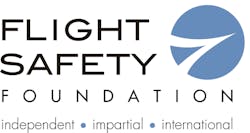Flight Safety Foundation (FSF) is an international nonprofit organization whose sole purpose is to provide impartial, independent, expert safety guidance, and resources for the aviation industry. The FSF mission is simple: to be the leading voice of safety for the global aviation community. Historically, FSF has focused its safety initiatives on flight operations, but in late 2012 established the Maintenance Advisory Committee (MAC) consisting of aircraft maintenance leaders from a variety of aviation organizations. Recently, I spoke with the Foundation’s Director of Global Programs Rudy Quevedo on what initiatives FSF has on its agenda regarding aircraft maintenance.
AMT: How is the FSF membership divided across the different segments of aviation?
RQ: Currently, the largest industry segment FSF is involved with would be business aviation, followed by the airline segment and the manufacturers. We focus on aircraft operations that are professionally flown so general aviation has not been a focus for FSF.
AMT: Would you say your mission and initiatives are more directed toward any one particular segment of the industry?
RQ That depends on what the issue or concern happens to be. For example, the issue of continuing to land during an unstabilized approach occurs across the boards. Fatigue management is another topic that is seen in all segments of aviation, with much more emphasis placed these days on fatigue in the aircraft maintenance work force.
AMT: How does the FSF mission relate to aircraft maintenance?
RQ: Safety is not just a pilot or flight deck concern. Safety begins on the ground, on the ramp, in the FBO, dispatch, air traffic control, and aircraft maintenance. So according to the FSF mission, anything affecting flight safety could be an initiative here at FSF. This is why in 2012 FSF established the MAC. We’ve recognized the need to include maintenance in our initiatives.
AMT: What specific issues or concerns relating to aircraft maintenance have been identified?
RQ: According to data review and conversations with MAC members, the following four areas of concern have been identified as important to aviation safety.
Without a doubt, the No. 1 concern is Failure to Follow Procedures (FFP). This issue has been identified affecting all segments of the industry; GA to airlines. The key is to understand the psychology behind the issue and mitigate it. We need to understand what drives the behavior. Things like the design of the documentation, the workability of a task in different environments (line maintenance, heavy maintenance, etc.), or the effect of a lack of resources on behavior must all be understood so that mitigation strategies can be deployed.
The second area is professionalism in aircraft maintenance. There’s always been a belief that aircraft maintenance technicians lack professionalism, but there’s more to this issue than just the way a certain person may look or act. I feel you need to start by determining people’s backgrounds, personal history, behaviors. These factors and others all drive how someone acts, and in turn the way in which they are viewed by others.
Leadership and safety culture. These two items go hand in hand. Most aircraft maintenance professionals began by turning wrenches. Eventually, some of us would become a supervisor and transition to management requiring new skills. Historically, as an industry, we haven’t done a good job of supporting people through this transition. Today, most maintenance organizations require a broad range of skills when hiring, and one of those is the ability for a young new maintenance person to advance in their career and become a leader.
Quality and oversight issues. This item is also one that requires unique or additional skills to be developed in the work force. One of those additional skills is how to conduct safety oversight, identify risk, and how to report results. Many organizations are implementing a safety management system (SMS) and in the future most maintenance organizations will have a defined quality and safety program. Maintenance technicians must understand SMS and how they need to participate.
AMT: What subjects are currently being addressed by the MAC – Maintenance Advisory Committee?
RQ: During the last MAC meeting, two key initiatives were identified and working groups formed to dive deeper into each of them: FFP and error reporting. Error reporting in the United States has become more accepted, but some international cultures struggle with error reporting.
AMT: Does FSF and/or the MAC have any initiatives relating to students, in particular maintenance students, schools, universities?
RQ: Not specifically. However, I would encourage anyone who has the opportunity to speak to aviation maintenance students or address a group in school to highlight professionalism and leadership. I’d also encourage the mention of FFP. Tell young people and students now that it’s OK to stop and say no if something doesn’t appear right. I believe that these three points can and should be brought into schools. Ethics in maintenance should begin there.
AMT: How do you see FSF involved in future maintenance and/or maintenance safety-related initiatives?
RQ: The MAC and its related initiatives are still young and will mature over time. As an example, investigators look at every little issue regarding flight when an accident occurs. But for maintenance sometimes we don’t go deep enough and all too often the cause stops at the hangar door and an event is just chalked up to maintenance error. As an industry we need to go deeper, encourage reporting on all levels, and continue to collect, analyze, and report on event data. This is the only sure way to implement true corrective actions.
Rudy Quevedo, Director of Global Programs, can be reached at [email protected]. For more information on Flight Safety Foundation visit: www.flightsafety.org.



